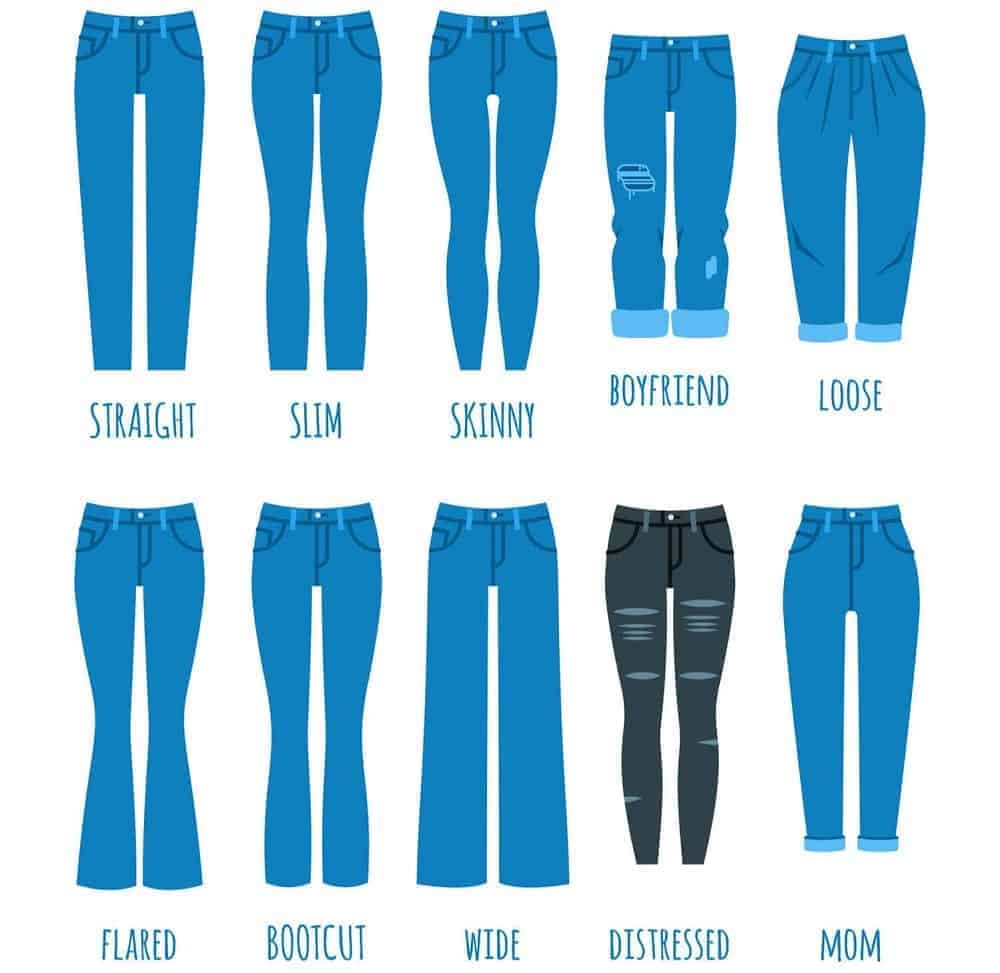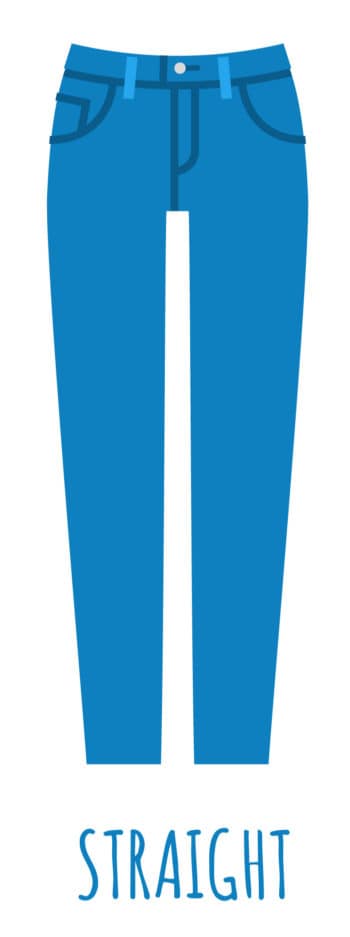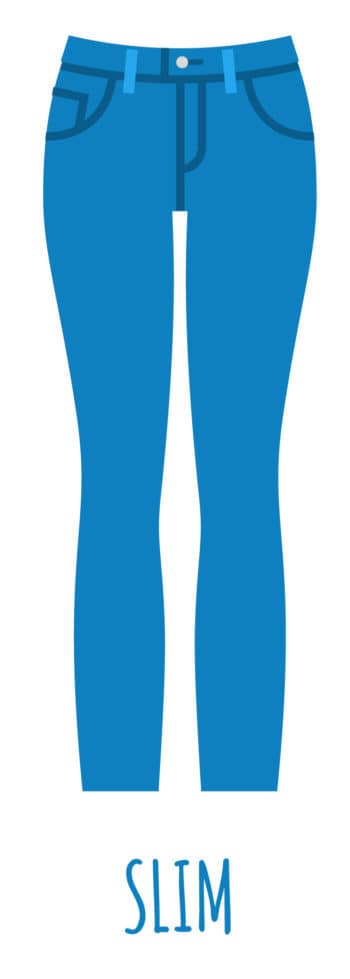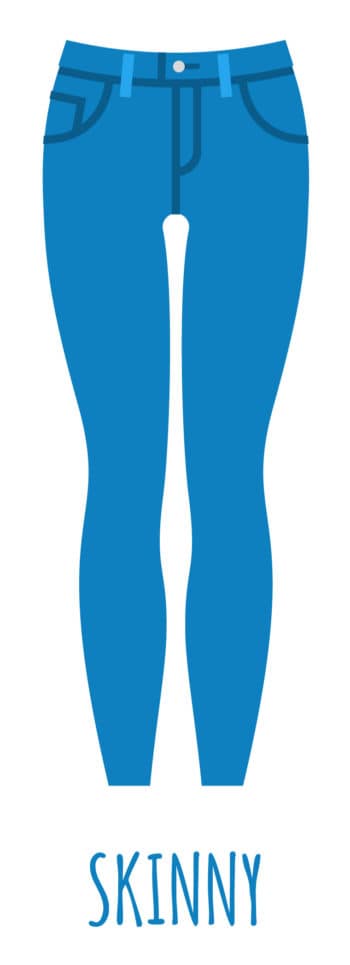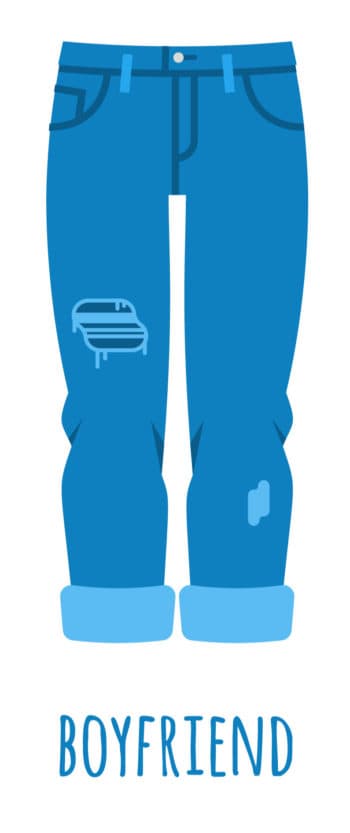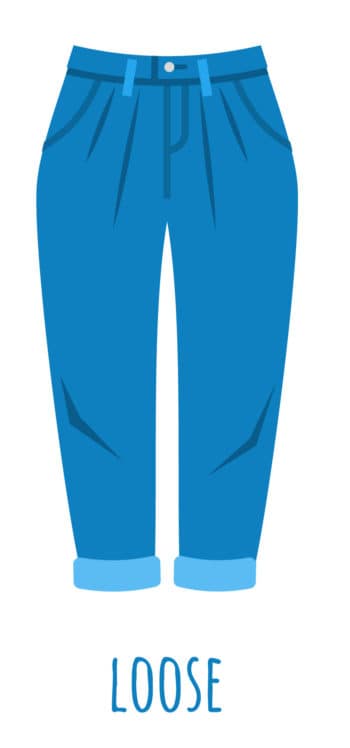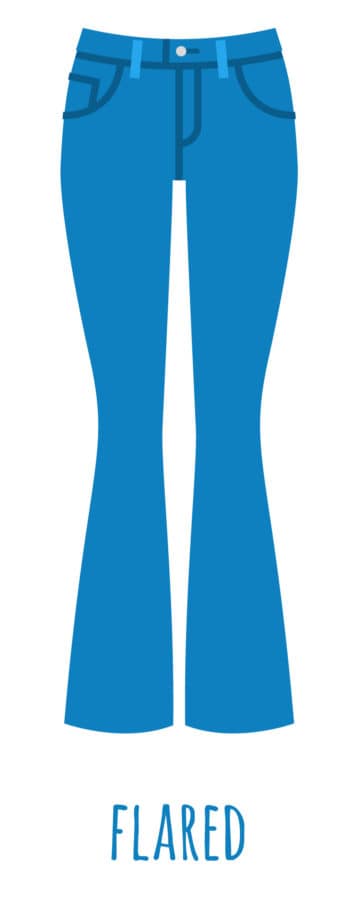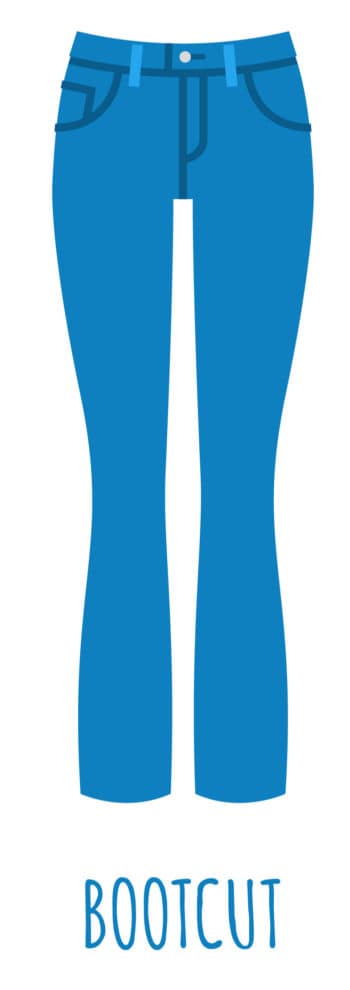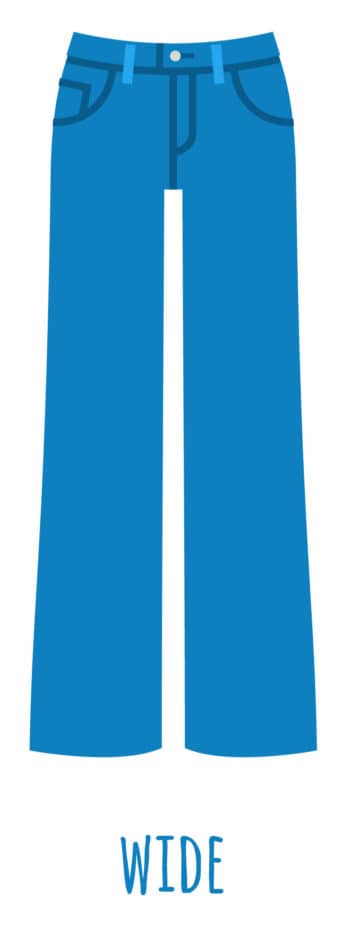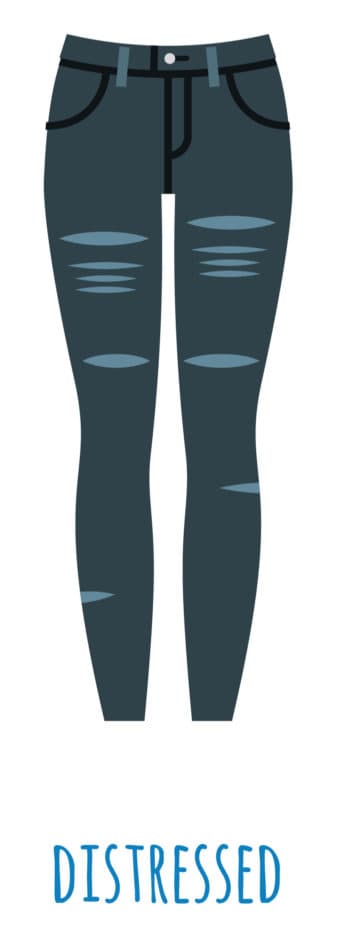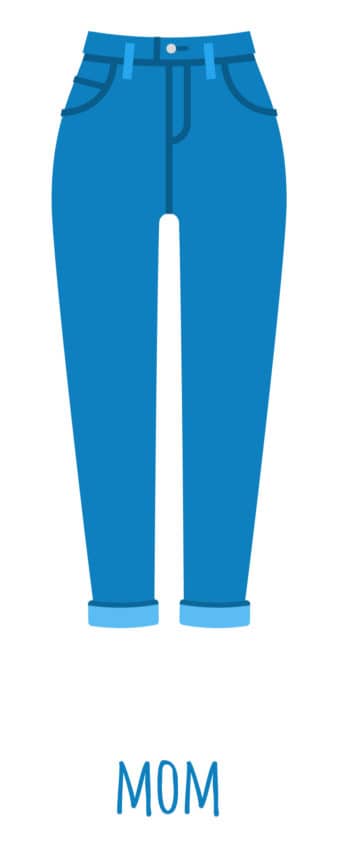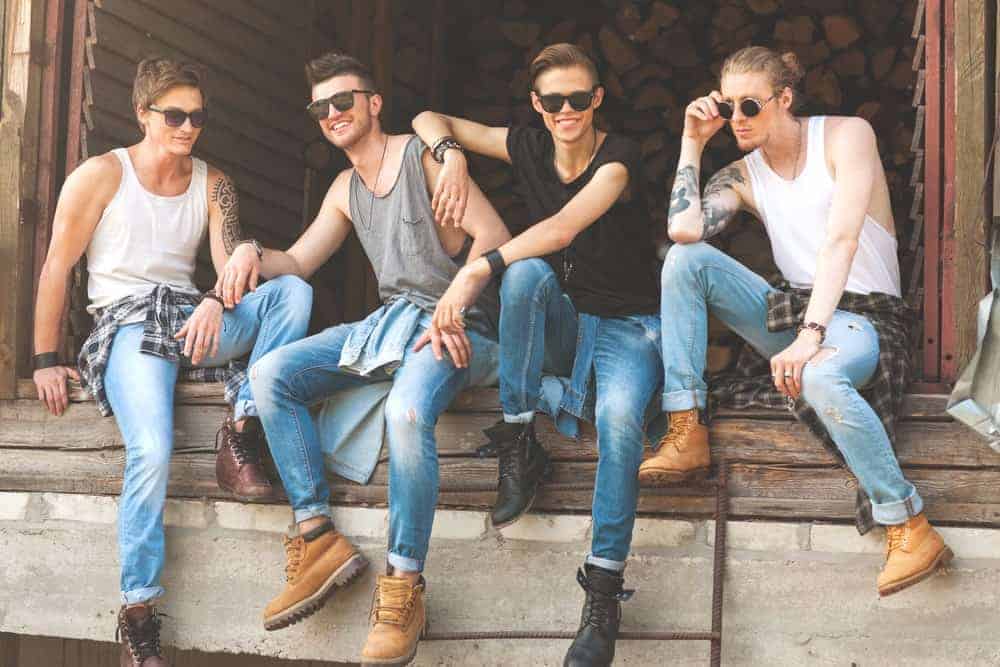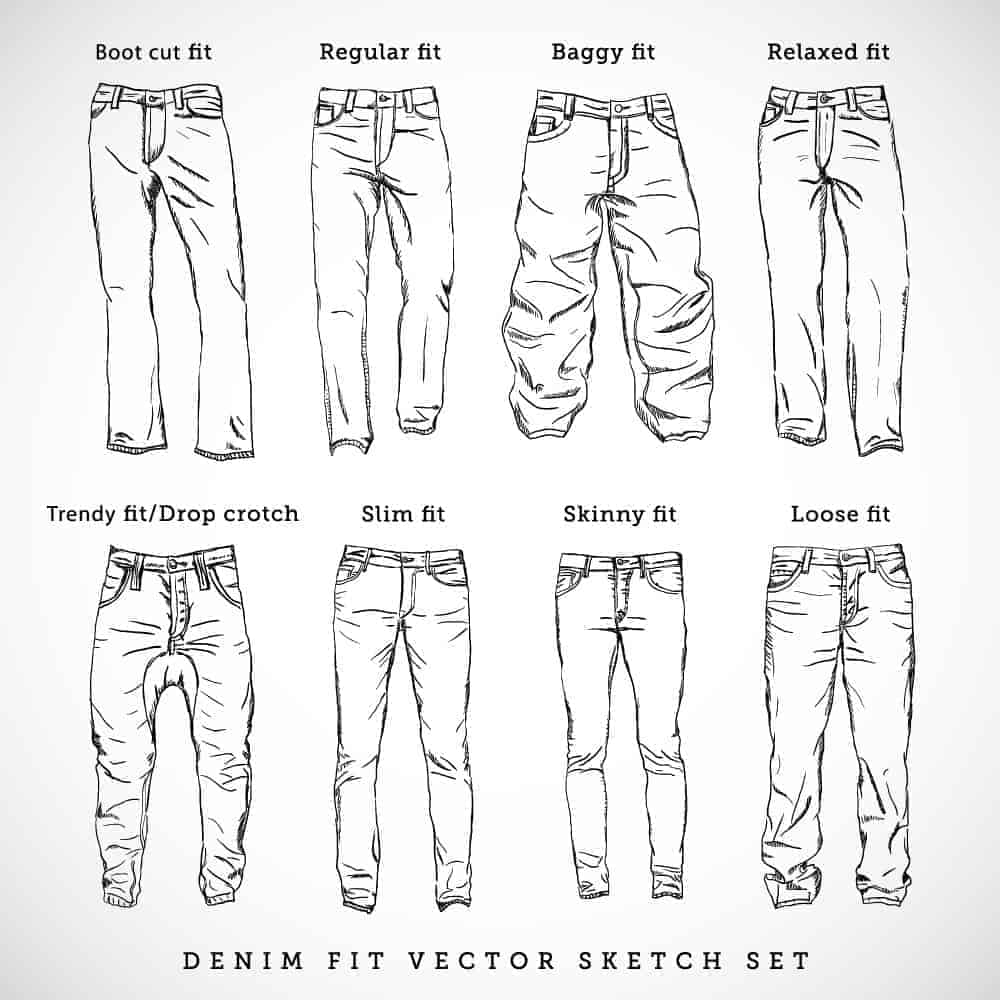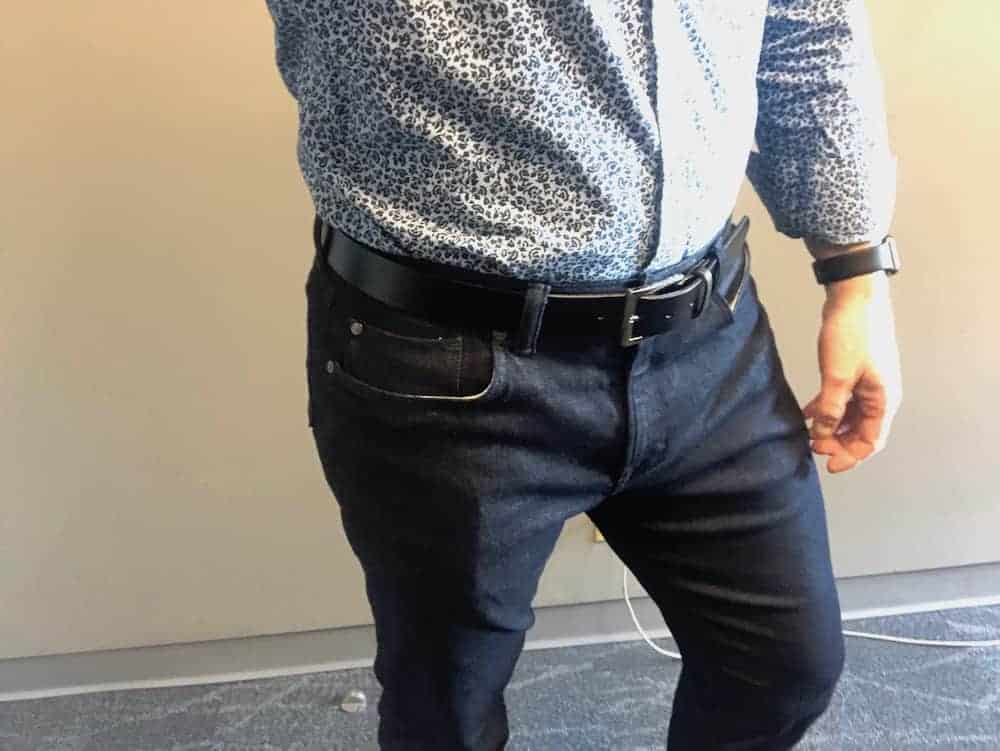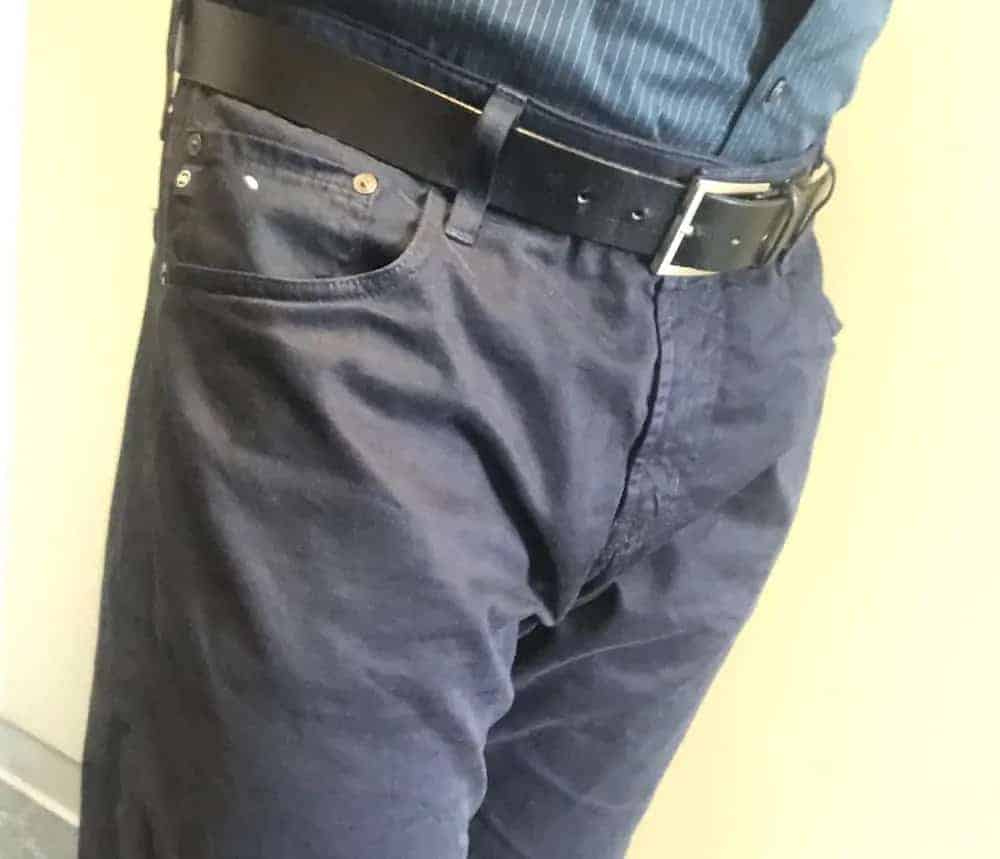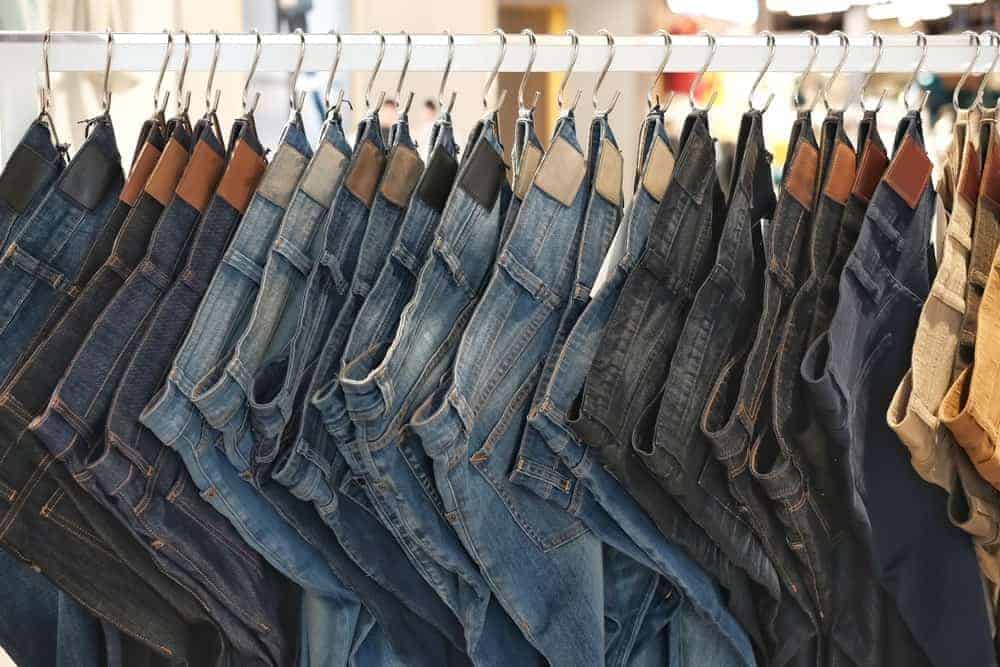Check out this awesome chart illustrating the 12 different womens' jeans and 12 types of men's jeans organized by various styles and cuts. This is the ultimate guide to jeans.
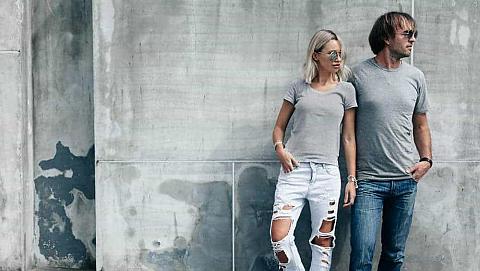
In 2013, denim jeans turned 140 years old. May 20, 1873 is widely considered the day blue jeans were invented. They are still wildly popular; 450 million pairs are sold in the USA each year alone [Source: CNN].
Since the invention, many different types of denim jeans have evolved. Just as there are many different types of pants for women, there are many different types of jeans (as well as jean brands) for women and men along with advantages and disadvantages of wearing jeans.
However, not all cuts are in style at the same time. Below, we set out the 10 main blue jean cuts and styles for women accompanied by real-world examples. Above is our nifty chart.
Contents
Related: Most popular color for jeans | Best way to wash jeans
History of Jeans
Jeans are pants made from denim cloth. The apparel was first introduced by Levi Strauss and Jacob Davis in 1873 and has passed the test of time. Jeans are named after the city of Genoa in Italy, where a sturdy cotton corduroy fiber, called jeans was manufactured.
In 1851, Levi Strauss came to New York from Germany to join his brother and help him in running the family dry goods business. In 1853, he moved to San Francisco to set up the Western Branch of his family business, which also included selling cotton cloth. There, he met Jacob W. Davis, a tailor who made functional items like horse blankets, tents, and wagon covers.
In 1871, one of Davis’ customers asked him to make a pair of pants that could withstand rough and hard work. Davis bought the denim cloth from Levi Strauss & Co and reinforced it with copper rivets on the flies and pockets, calling it “blue jeans”. Davis later decided to patent them and wrote to Levi Strauss. They became partners and opened up a big denim factory. And hence, jeans were born.
For the past 150 years, jeans first became a symbol for the working class, then a symbol of counterculture and defiance, and now a fashion statement. Jeans have also evolved from the standard blue-collar worker-issued apparel and now come in dozens of styles. Jeans also come in a wide variety of colors, though blue still remains the preferred shade.
Types of Jeans for Women
Chart Setting Out Different Jean Styles for Women
Now that you have a bird’s eye view of all the different cuts, check out real-world examples below plus a few tidbits of interesting info about the various styles.
1. Straight Leg

Straight cut jeans are a conservative cut that while not always the most stylish, isn’t necessarily out of style either. It’s a classic cut.
What are straight leg jeans?
The pant leg is somewhat consistent width all the way down the leg. Tighter on the thigh, slightly loose around the calf and ankle.
2. Slim Fit

What are slim fit jeans?
They’re cut to fit snuggly around your thighs and butt. They loosen up a tad down the leg. They should not be confused with a skinny cut, which maintains snug fit down the entire leg.
3. Skinny Cut

What are skinny jeans?
While slim fit jeans are cut to the contour your butt and thighs, skinny jeans take it to the next level by being tight in butt, thighs and entire leg. They’re essentially denim stretchy pants. Both men and women wear this cut. Yes, they can be comfortable these days with the invention of stretch denim.
Learn about what to wear with skinny jeans here.
4. Boyfriend Jeans

What are boyfriend jeans?
They’re loose, comfortable lounging jeans without entirely throwing style to the wind. They’re often a bit distressed, worn but have more give and room than skinny or slim-fit jeans.
5. Loose Fit
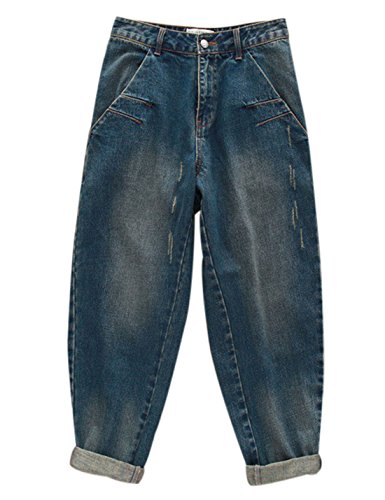
The loose fit hangs down low on your waste and offers ample room in thighs. The leg opening may narrow a bit.
6. Flared Cut

What is a flared cut jean?
It’s tight on thighs and butt but flares wide at the bottom. The flare is more pronounced than the bootcut jean. These were popular in the 1970s and were referred to as bell bottoms.
7. Bootcut

The bootcut jean has a practical application in that the bottom opening and calf area widens to accommodate boots. The boot cut isn’t necessarily as tight around butt and thighs as the flared jean.
8. Wide Leg

The wide leg offers a wider cut leg from top to bottom. They are wide at the thighs and bottom.
9. Distressed

Distressed jeans are not so much a cut as it’s referring to a style. The style is a worn look, often including rips.
10. Mom Jeans

Wouldn’t you know it, the mom (and dad) jean is in style. Amazing, right? The name was as unflattering as the style. Yet, ironically, now the mom jean is in style. Go figure? It’s a loose, unshapely jean cut worn for comfort. Think dockers in denim. The butt is high, the zipper / front loose, together creating an unflattering look… except style really is perception and if the high butt and the loose front are stylish, it looks good, right?
11. Low Rise
Low rise jeans have a short rise and site low on the waist. They can be a bootcut, straight leg, boyfriend, or skinny jeans. The name applies to the rise only. Here’s an example:

12. High Rise
A high rise cut jean has an extra rise in the seat so the pant waist sits higher up. They can be a straight leg, skinny, slim fit, etc. Here’s an example of high rise skinny jeans:

B. Types of Jeans for Men
Blue jeans are the type of trousers that you can find in every man’s closets. What is so wonderful about blue jeans is that they can be dressed down or dressed up. In fact, you can wear them practically anywhere, short of a black-tie event.
However, jeans have come a long way from their origin almost a century and a half ago.
More: The absolute best jeans for men (by price and cut) | Banana Republic Jeans Review | AG Mens Jeans Review
Blue Jeans Chart for Men
Nowadays, there are so many different styles of jeans, it often leaves men confused about which ones they should buy. Below are a few styles that you can go for.
1. Regular Fit Jeans

This classic jeans-style flows down in a straight line from the hip to the thigh. Regular fit jeans are mid-rise and have a large leg opening. These jeans are often worn by men who are not too slim but not too thick either.
2. Slim Fit Jeans

A lot of men are confused about slim fit jeans and mix them up with skinny jeans. Not too tight and not too loose, slim fit jeans were designed keeping in mind men with slender body frames. This type of jeans tapers as they flow down the leg but have more space around the thigh area. They offer both comfort and style to skinny men on whom classic jeans look too baggy. However, this style is now adopted by men of all body types. Slim fit jeans often go hand in hand with a slim fit shirt or T-shirts.
3. Skinny Blue Jeans

Unlike the slim fit jeans, skinny jeans are tight from the waist all the way to the ankles. Often times, synthetic material is mixed with denim to make it more stretchable, easier to wear, and give the person more mobility.
Skinny jeans are worn as a style statement; they highlight the legs and make them look longer, so men who are slim or short should give these a try. However, those with thick body frames should avoid them as they can be too tight for them.
4. Loose Fit Jeans

These jeans have a very relaxed and baggy fit, which offers your legs a lot of breathing space. Loose jeans provide a lot of space in the thigh and buttocks area, offering maximum comfort. These jeans are best suited for men who have big thighs or large body frames. One of their biggest selling points is that they do not cling to your upper legs or make you sweat, which can lead to itchy rashes.
These days, loose fit jeans are the preferred garment in the hip-hop culture.
5. Tapered Fit Jeans

Tapered fit jeans are quite relaxed and comfortable around the thigh and butt area but are tapered towards the ankle. They are a good choice for men who have a bigger waist and thighs, as well as for those men who are not comfortable trying out slim fit or skinny fit jeans. Right now, tapered jeans are enjoying their time in the spotlight.
6. Low Rise Jeans

The rise of any jeans is measured by the distance between its waist and crotch area. On regular pants, the rise is 12 inches. However, on low rise jeans, it is just 8 inches and for some radical versions, just 3-4 inches. Low rise jeans are usually buttoned-up several inches below the navel or on the hipbone. They are usually worn by those who have a skinny frame and are considered one of the coolest clothes these days.
7. Stonewashed Jeans
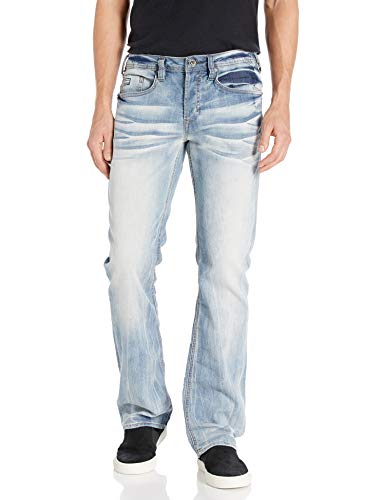
Acid washed jeans, stonewashed jeans or faded jeans became extremely popular during the mid-80s to the mid-90s. These jeans are treated with pumice stones, potassium permanganate or an array of other chemicals to achieve the faded, worn look. This technique can be applied to all types of jeans-style and hence remains very popular.
8. Distressed Blue Jeans

Distressed jeans, also called ripped jeans, were invented by designers looking to expand the horizon of jeans when it comes to its styles. These jeans are subjected to a technique called sanding, where sand is blasted on the fabric, resulting in rips and holes on the denim. This tattered look is the epitome of casual and cool, which gained prominence in the grunge, cultural punk era of the 1970s. They are still extremely popular today.
9. Ripped and Repaired Jeans

Taking the ripped look to the next level, are the ripped and repaired jeans. These jeans are distressed denim in which the tears have been partially patched up in some ways. Most designers use denim patches in contrasting colors to completely fill the holes. Like distressed jeans, this style is also quite popular.
10. Cuffed Blue Jeans

As the name indicates, cuffed jeans have rolled up cuffs on the hem of the jeans. These are a raging trend these days; however, it was a necessity in the 19th century, when Levi Strauss first created the pants. Early wearers of the classic jeans would get their trousers one or two sizes bigger to compensate for the time it would shrink. Meanwhile, they would roll up the ends of their overlong jeans, never knowing this would become a trend over a century later.
11. Boot Cut Jeans

Boot cut jeans are considered the ideal balance between a straight and slim-cut pair of jeans. The jeans flow in a straight line to the knees but the circumference widens around the ankle area. As the name suggests, this was done to accommodate high top boots. They are also great for men who have thin body frames with slightly heavier thighs.
12. Stacked Jeans

These jeans are longer and stop a few inches below the ankle, causing them to bunch up or stack above your shoes. Once, these were seen as a lazy and sloppy look but now, the music industry has made it a fashion statement. This style works best with slim fit jeans or any jeans that taper from the knees down.
13. Cowboy Jeans
Learn all about cowboy jeans here.
Blue Jeans for Five Primary Body Types of Men
Ectomorph
A person with an Ectomorph body type has a light build, lean muscles, and small joints. They are typically taller but can also be short. Men who are ectomorphs should wear straight-cut jeans with a low rise. They should avoid skinny or tight-fitting jeans as they can make him look even skinnier.
Mesomorph
This type of body is characterized by a large bone structure and large muscles. Mesomorphs have a naturally athletic built and can easily lose or gain weight. They should go for a slim fit or straight cut jeans with a low waist.
Ectomorph-Mesomorph
This type of body is larger than ectomorphs but smaller than mesomorphs. They have an average height with moderate muscles. These men should also opt for straight and slim, low-riding jeans.
Endomorph
This type of body typically has a stocky built with heavy fat and muscle mass. These men gain weight easily and have trouble cutting down fat. Endomorphs who are tall should avoid low-rise pants and should go with wider cut leg pants that easily fit over their quads. They should also try some athletic cut pants. For shorter endomorphs, slightly slimming jeans are a good choice. Avoid loose jeans as they can make them look thicker.
Mesomorph-Endomorph
Although smaller than pure endomorph, this body type is larger than mesomorph. Men with this body type are of average or slightly below average height with big muscles. Men who have a combination of the two body types should try wearing relaxed and slim-cut jeans without stretch.
The above suggestions in the article are not set in stone. They are merely observations on what style of jeans look good on what body type. However, every person has his own preference and comfort zone. You should take into account your own personal style and then narrow down some styles of jeans for yourself. You’ll also have to factor in your unique body shape as an ill-fitting pair of jeans can make anyone look frumpy.
As you can see, the world of jeans is intricate and multi-layered. It takes a lot of research and some trial and errors before you can find the right pair of jeans for you. However, once you have found that perfect pair, you’ll be ready to tackle any trend.


